Your basket is currently empty!
Written by
Combi boiler vs System Boiler – Which is best?

Combi Boiler vs System Boiler – What is the difference and which is best?
Purchasing a boiler is a big investment and one that you’ll want to get right. You want to know that you can have hot water and heating whenever you need it.
Get fixed prices online in just 20 seconds – Click here
Then with the ever-increasing costs of energy bills, efficiency is also hugely important as well as knowing that you’re doing what you can to reduce carbon emissions.
However, before you even get to the point of looking at the different manufacturers and their models, you’ll need to decide which type of boiler is the right one for your home. And for most people, that means either a combi boiler or a system boiler.
In this comprehensive guide, we’re going to look at these two different types of heating systems and provide you with all the information you need to make a perfect choice.
Get your Fixed Price Boiler Quotes Online
New Gas Boilers with £0 Deposit & 0% Interest Finance Availble
Get the best quotes for boiler installation online in under 1 minute now
The combi boiler
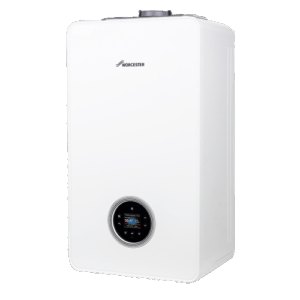
As the most popular type of heating system in the UK, the combi might seem to be the obvious choice, but that’s not always the case. So, let’s find out why the combination boiler might, or might not, be the perfect heating solution for you.
How does a combi boiler work?
Combi boilers get their name because they combine the functionality of a high-efficiency water heater with also being a central heating boiler.
With two heat exchangers, the best combi boiler works by having one linked to the hot water supply and one linked to the radiators of the central heating system.
When you need hot water, a sensor tells the combi boiler to burn fuel so that the exchanger becomes hot. As the water flows over the exchanger, it heats up, ready for use.
Get fixed prices online in just 20 seconds – Click here
Control valves
The combi boiler has control valves that work in different directions to each other. So, that means that it will either send the hot water to the radiators or to a hot water tap. It can’t, however, send the heated supply to both destinations at the same time.
Because combi boilers heat water on demand and take that supply directly from the mains, there is no need for a cold water tank or a hot water cylinder.
Get your Fixed Price Boiler Quotes Online
New Gas Boilers with £0 Deposit & 0% Interest Finance Availble
Get the best quotes for boiler installation online in under 1 minute now
Advantages of a combi boiler
High levels of efficiency
Since April 2018, all boilers have been required, by law, to achieve a minimum of 92% efficiency.
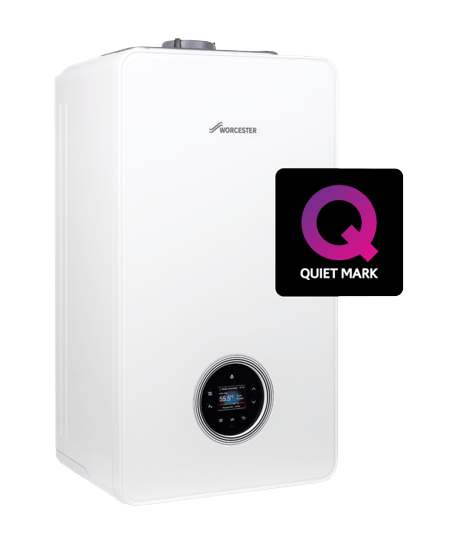
That means that a maximum of 8% of the fuel used to heat the water may be lost during the heating process. It’s also a requirement for a room thermostat and a timing control device to be installed.
Boiler Plus regulations require that there must also be one other fitment of an energy-saving feature. Because of the diversity of requirements, it’s been left to the homeowner and the heating engineer to decide which one of the following four is the best option for that particular install.
- Flue gas heat recovery systems
- Weather Compensation
- Load Compensation
- Smart controls featuring automation and optimisation functions
These additional requirements mean that combi boilers deliver environmental benefits over other types of boilers and are also highly energy efficient.
Compact
With no requirement for tanks or cylinders, combi boilers are easy to install into spots that just wouldn’t work for other types of boilers. Many boiler manufacturers have models that have been designed to fit into an average kitchen cupboard meaning that you can hide it away behind a cupboard door.

Quick and simple installation
All that needs to be fitted is the combi boiler itself. That means that installation will be much quicker compared to a system or conventional boilers. And that’s going to mean a lower installation cost.
Instant hot water
Combi boilers provide hot water on demand. As soon as you turn on the hot water tap, the boiler fires into action and delivers hot water. System and regular boilers heat the water in advance and then store it within the hot water cylinder. While that may seem like a good idea, when you’ve used up the tank then you have to wait for another tank full to heat up.
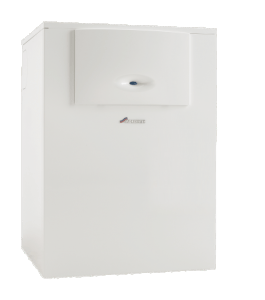
Mains water pressure
Combi boilers take their cold water directly from the mains supply. So as long your supply has a good level of mains pressure, then you can get exactly the same through your combi boiler system.
It saves you money!
And that’s always a good thing. The saving on your energy bills comes from the fact that water is only heated in small quantities. You only heat what you need to use. A system or conventional boiler meanwhile heats a whole hot water cylinder full and over time that will begin to lose some of its heat.
Safe and clean hot water
We’ve all seen those films where something awful is lurking in the water tank in the loft. While there might not be anything that sinister in your water tank the combi boiler completely removes that worry as there is no storage of water.
You’ll also have no worries about the loft pipework freezing or leaking boiler water tanks because there aren’t any!
Get fixed prices online in just 20 seconds – Click here
Get your Fixed Price Boiler Quotes Online
New Gas Boilers with £0 Deposit & 0% Interest Finance Availble
Get the best quotes for boiler installation online in under 1 minute now
Disadvantages of a combi boiler
Combi boilers fail to meet a high demand for hot water
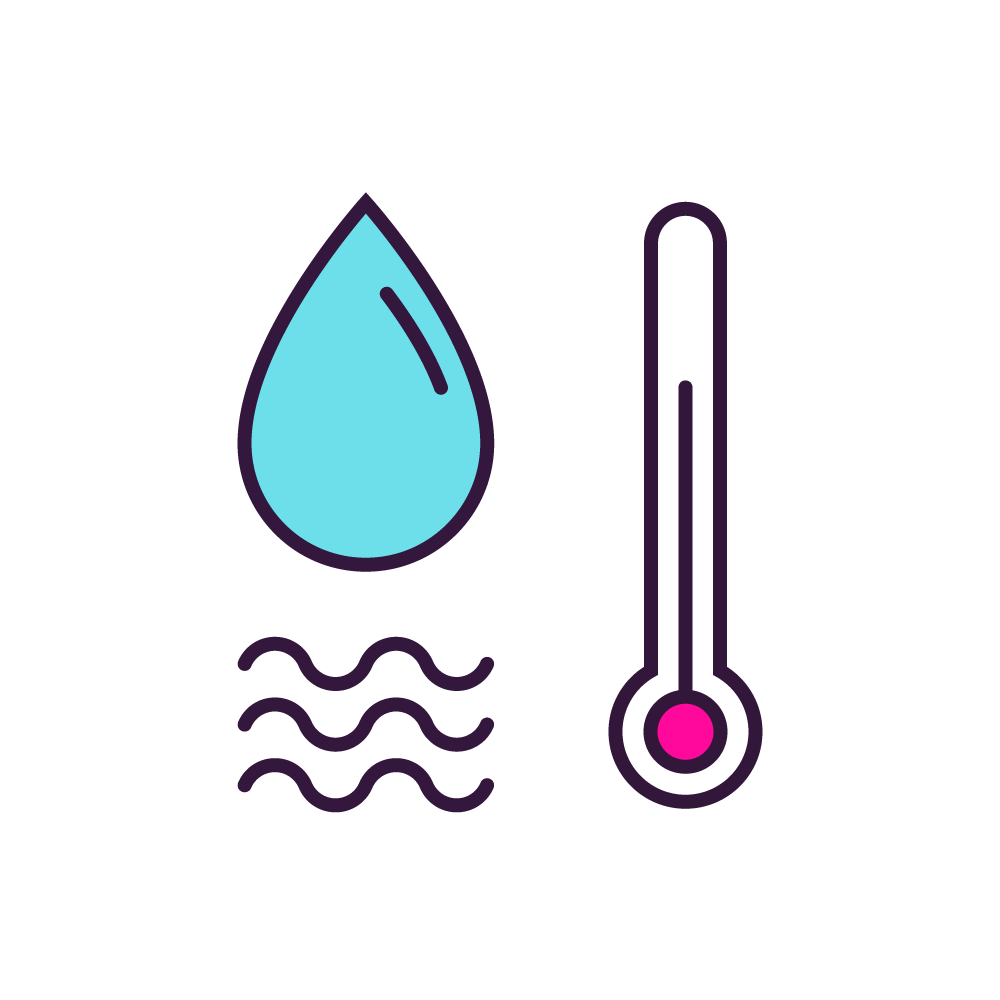
Now, heating on demand is great when it’s just you that needs the hot water. But when you need hot water from different outlets at the same time then you’re going to have problems, especially with two or more bathrooms. It might be that the pressure drops dramatically or that one outlet gets cold water, and that’s no fun when you’re in the shower!
May not be suitable for properties with old pipes
Many of the older heating systems are designed for a low levels of water pressure. With the combi boiler using the mains pressure, it means that the water pressure is much higher. That, in turn, can cause leaks and cracks in older pipework. The water pressure issue is often the main consideration in deciding whether to move from conventional boilers to a combi boiler.
No back-up immersion heater
Unlike system or conventional boilers, the combi boiler doesn’t have a backup immersion heater. So that means that if the boiler breaks down then unless you have an electric shower, you’re going to be left without any hot water or heating.
Complex set-up
Having a boiler that’s highly technical and has loads of features might seem like a good idea until it breaks down. Combi boilers need complex chips and electronic devices for them to function.
That then means that if the boiler breaks down then the repair is often more expensive compared to a similar repair to a system or conventional boiler. It’s also argued that combi boilers take more time to fix as well and that results in higher repair bills when your heating engineer is on an hourly rate.
Patience is needed
When you turn on the hot water taps, it is going to take a few seconds for the combi to generate the hot water. Now, it’s not going to take long but it is slower than a system boiler. Don’t forget to collect that cold water for use later to prevent it from disappearing down the sink unused!
The system boiler
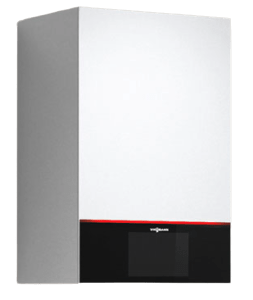
Combi boilers so seem to have a whole range of advantages, but there were some disadvantages there too. If those disadvantages create issues for you and your home, then it may be time to consider a system boiler instead.
How do system boilers work?
This type of boiler works similarly to a regular standard boiler. However, unlike standard boilers, the water supply is taken directly from the water mains.
So, the cold water from the mains enters the boiler first. Then the heat exchanger will heat up the water and as it heats up, the water is then transferred into the hot water cylinder. Here is where it will stay until it is required. Because there is a larger amount of hot water available, multiple taps or showers can be used at once – a steady supply of hot water is readily available.
While the combi boiler heats the water on demand, system boilers heat the water and then store it in a separate hot water storage cylinder.
Get your Fixed Price Boiler Quotes Online
New Gas Boilers with £0 Deposit & 0% Interest Finance Availble
Get the best quotes for boiler installation online in under 1 minute now
Advantages of a system boiler
Simpler installation than regular boilers
Compared to the regular boiler, also known as a conventional boiler and traditional heating, system boilers are quicker and easier to fit.
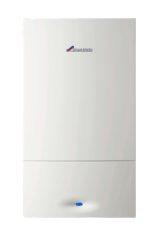
While system boilers require a cylinder for storing hot water, all of the major heating and hot water system components are built into the boiler itself. This makes it quicker and easier to install, and that in turn, means a lower installation cost.
Where you already have an existing system boiler, installation is going to be much easier to replace the old heating system with one of the same types of boiler that you currently have.
Perfect for power showers
If you have a power shower installed then you’re likely to find that a combi boiler just doesn’t have the pressure to be able to get the full benefit. With a system boiler and a pump, then you can feel the full force of a power shower even with more than one bathroom.
Constant supply of hot water
With the pump of the system boiler, hot water can be delivered much more quickly compared to a combi boiler. As the heated water is already stored in the hot water cylinder, there’s no waiting for it to heat up giving you instant hot water.
Doesn’t need a cold water storage tank

Unlike a conventional boiler, there is no requirement for a cold water storage tank or a feed and expansion tank in the loft. That means that system boilers take up much less space when compared to a regular boiler. Another bonus here is that there is no risk of the loft pipework freezing nor leaks from the cold water tank.
Compatible with solar water heating systems
System boilers can be adapted so that their energy supply comes from solar energy. This can then deliver environmental benefits through moving away from a dependence on fossil fuels and their high levels of carbon emissions.
With the push to move consumers away from gas and towards renewable energy supplies, solar compatibility could provide a huge benefit over combi boilers.
Get fixed prices online in just 20 seconds – Click here
Disadvantages of system boilers
To make sure that you have all the facts and can make a balanced decision, you need to be aware of some of the system boiler cons as well.
Take up more space than a combi
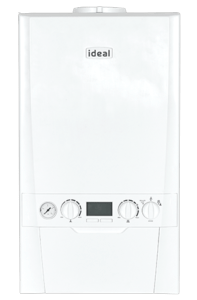
So although the system boiler takes up less space compared to a conventional boiler, it does need a hot water cylinder and that means more space than combi boilers. In many homes, the hot water storage cylinder is fitted into the airing cupboard to hide it away but that’s still space that could be used for something else.
Hot water cylinder insulation
It might be tempting to get the hot water tank and then leave it to do its thing. But, if the insulation isn’t up to the job then the hot water is going to quickly start to cool down
That then means that you’ll need to pay for it to be heated back up which means higher bills and lower levels of energy efficiency.
Supply is limited by the size of the hot water tank
Whether it’s just you that wants a shower or whether it’s the whole family, the same capacity for storing hot water. That means that when it is everyone wanting a shower, you’re likely to run out of hot water and when it’s just you, then more energy has been used than was necessary.
No continual flow of hot water
Once all the hot water has been used, then you’ll have to wait until the hot water tank heats more water. While this might not be a problem for small families, if you have guests across then you may find that the store of hot water isn’t enough to meet the hot water demand.
Cooling down of the hot water
When you store hot water it’s inevitable that no matter how good the insulation is, there will be some heat loss. That then also affects the level of the boilers energy efficiency.
Pre-programming needed for the hot water system
Because system boilers heat the hot water in advance of when you need it, you’ll need to programme into the thermostat when you want that heating to take place.
Now, that’s fine when you have a regular schedule of when you need hot water but if you step outside of that then the hot water system may not be able to supply the hot water you need
Get your Fixed Price Boiler Quotes Online
New Gas Boilers with £0 Deposit & 0% Interest Finance Availble
Get the best quotes for boiler installation online in under 1 minute now
Which is the best boiler for an apartment?
If you live in an apartment then space is often at a premium which means that you need a central heating boiler system that’s going to take up as little room as possible while still being able to meet your hot water needs.

With no need to find room for a separate hot water cylinder that’s likely to mean that a combi boiler is going to be the best option for you. As for a regular boiler with a cold water storage tank in the loft, probably not suitable for apartment living!
There is a whole range of combi boilers perfect for smaller living spaces.
Look out for those with Quiet Mark accreditation as these make virtually no nosier when operating so could be installed in any room of the home without causing a disturbance.
Most apartments are 2 bedrooms so this guide on the best boilers for 2-bed homes may help you.
Which is the best boiler for a small family home?

For a small family home with one bathroom, then it’s likely that a combi boiler is once more going to be one of the best boiler types for the setting. The flexibility that comes from instant hot water makes combi boilers perfect for busy family life.
The key here is making sure that the central heating system installed is large enough to meet your needs. There can be quite a variety in the size of combi boilers so getting the right one is important.
Read more: Best boiler for a 3 bedroom home
The right size of boiler
The size of a boiler is measured in k/W and there are three elements that need to be considered in choosing the right size of boiler:
- number of radiators in the heating system
- number of bedrooms
- number of bathrooms
For a combi boiler:
24 – 27kW combi boiler is suitable for: one or two bedrooms, up to ten radiators, and one bathroom.
28 – 34kW combi boiler is suitable for: three to four bedrooms 10-20 radiators, and one or two bathrooms.
35kW + Combi boiler is suitable for: more than four bedrooms, over twenty radiators, and up to two or more bathrooms.
It’s important though to also take into account the mains water pressure as otherwise even the most powerful comb boiler is not going to be an efficient and practical fit.
If you need the right boiler for a 5 bed or larger home then you may need a system or heat only boiler.
For a system boiler or for conventional boilers
Because system and regular boilers store hot water ahead of time, they’re built with a lower power output compared to combi boilers.
9 – 18kW system or conventional boiler is suitable for: up to two bedrooms, ten radiators, and one bathroom.
18 – 26kW system or conventional boiler is suitable for: three to four bedrooms, 10-20 radiators, and up to two bathrooms.
27 – 40kW system or conventional boiler is suitable for: more than four bedrooms, over twenty radiators, and two or more bathrooms.
Get your Fixed Price Boiler Quotes Online
New Gas Boilers with £0 Deposit & 0% Interest Finance Availble
Get the best quotes for boiler installation online in under 1 minute now
Which is the best boiler for a home with more than one bathroom?

Generally, the advice is that if a home has more than one bathroom, and those bathrooms are going to be in use at the same time, then you’re going to need either a system boiler or a conventional boiler.
However, some boiler manufacturers are now producing combi boilers with a much higher size in an attempt to meet the needs of larger homes with multiple bathrooms.
Should the boiler power relate to central heating system or hot water?
In most situations, it’s the number of bathrooms and your hot water demands that’s going to be the deciding factor for the best boiler option.
High numbers of bedrooms but just one bathroom, will need a lower kW boiler compared to a home with fewer bedrooms but more bathrooms. And, that’s even more so the case when you have showers in use at the same time.
Efficiency issues with with larger combis
One of the key issues with the larger combi boilers is that they can be very inefficient which in turn means higher fuel bills. That’s because all boilers operate within a range. That could be between 2-20kW or 8-30kW. At the bottom end of the range, the combi boiler works more efficiently all year round.
However, on larger combi boilers, their lower range is higher, so 8-12kW is a popular configuration. That now means that even when demand is low, it’s operating at 8kW rather than the 2kW of the smaller boiler. This results in the boiler being oversized for most of your heating needs.
Read more: Best 30kW boilers for your home
Get your Fixed Price Boiler Quotes Online
New Gas Boilers with £0 Deposit & 0% Interest Finance Availble
Get the best quotes for boiler installation online in under 1 minute now
Which is the best boiler for a home needing lots of hot water?
Great question but you need to be a little more specific in your requirements. Combi boilers heat water on demand, so you could argue that they’re able to supply as much hot water as you need.
However, the system or conventional boilers have a pre-heated supply and so they can supply a full tankful, to multiple outlets at the same time.
So, if you need hot water throughout the day but to just one outlet at a time, then a combi boiler is likely to be a good choice. But, if you need hot water to several outlets at the same time, then you’re probably going to find that a system boiler is a better option.
The regular boiler
While this article focuses on the system / conventional boilers and the combi boiler, the regular boiler is also worth a mention. This type of traditional heating is also known as a standard boiler, and it has both hot and cold water storage tanks.
Because the cold water storage tank is usually housed in the loft, this immediately limits the type of property that can have a regular boiler due to the lack of this type of space.
The boiler lights up the gas, heats the exchanger and then the water can then be heated. Once at the required temperature it’s then transported to the hot water storage tank. When your thermostat signals the need for hot water, the hot water then travels through the radiators to heat up the home.
Replacing a traditional heating system
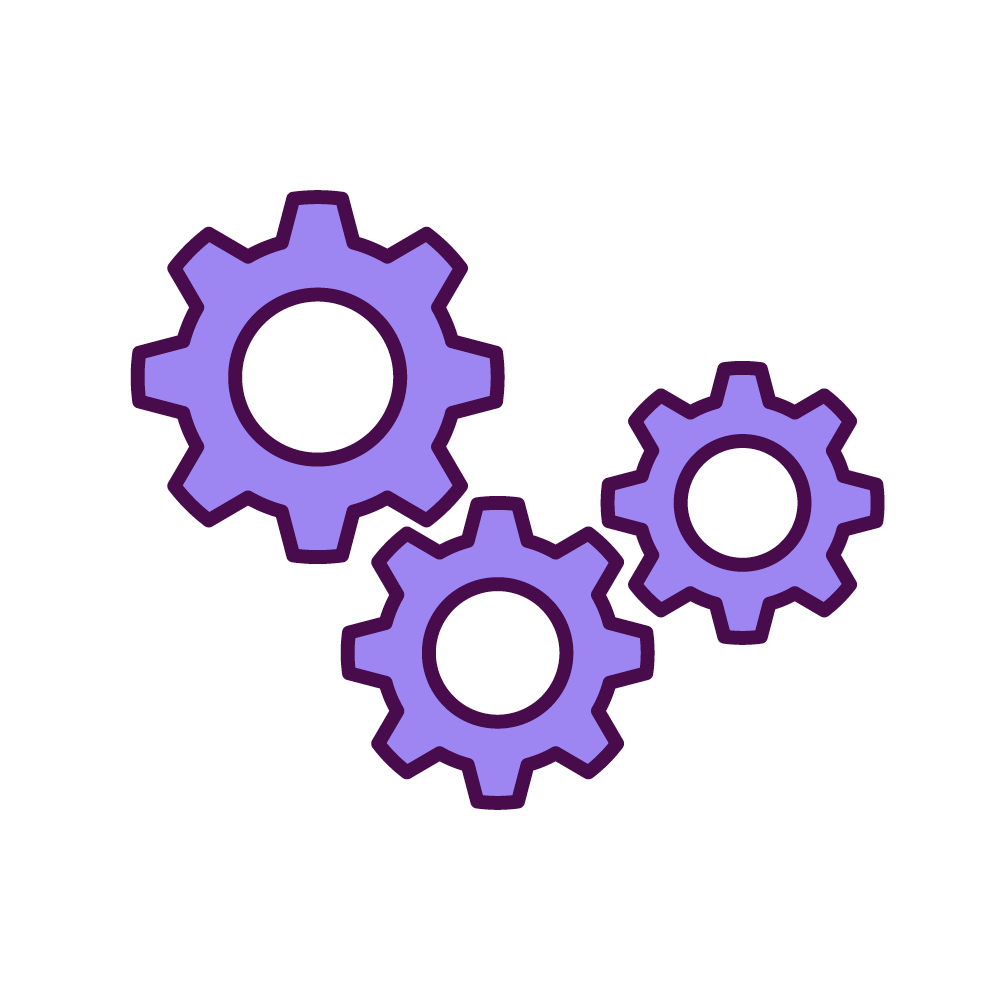
Traditional heating is often changed for the same type when a new boiler is needed. That’s usually because it’s easier to keep the existing older radiator system and just install one of the new boiler ranges.
Existing pipework or an older radiator system may also struggle with the pressure that comes from a hot water supply fed by the mains.
To replace the existing system with a new type of heating means not only replacing the existing boiler but also the pipework and that’s likely to mean an expensive installation bill.
However, if you need the space that will be freed from not needing cold water tanks and a separate hot water cylinder, then closing a combi for your new boiler might be a sensible investment.
Get your Fixed Price Boiler Quotes Online
New Gas Boilers with £0 Deposit & 0% Interest Finance Availble
Get the best quotes for boiler installation online in under 1 minute now
What about condensing boilers?
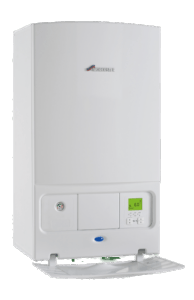
When fuel is burnt to produce hot water, gasses are released, which are then released through the flue. In a condensing boiler, the hot gasses are fed back into the heating system. After passing through a heat exchanger and the primary circuit, the heat can then be used to provide heat or to warm the water supply.
Non-condensing boilers used to offer a pretty low level of efficiency which was often right down to 75%. Boilers that use condensing technology, however, can achieve an efficiency of well over 90%.
No matter which new boiler you go for, combi system or even a heat-only boiler, it will be a condensing boiler.
Future proofing your new boiler choice
One important consideration for your new boiler replacement quote is to take into account how fuel usage is changing. With a push towards renewable energy sources, you may want to consider solar water heating systems or pellet stoves.
If you’re looking up at a grey sky and wondering just how reliable solar water heating systems might be in the UK, well thankfully hybrid systems are available that allow you to use solar where possible but then switch over to a mains supply on colder days to enable you to keep producing hot water.
Hydrogen boilers
Most UK homes rely on gas to power their central heating boiler. But with the use of gas comes high levels of emissions making it impossible for the UK to hit its climate change targets.

One solution is to replace natural gas with hydrogen gas. That’s because the only byproduct of burning hydrogen is water which makes it a carbon-free solution. The existing pipework within the gas infrastructure being capable of handling hydrogen makes for a relatively straightforward switch of energy supply.
What is a ‘hydrogen ready’ boiler?
As you begin looking for a new boiler, you might see that many are now being advertised as hydrogen ready boiler or H20 ready. That’s because nearly all gas appliances are able to run on a fuel made from a mixture of hydrogen and gas.
This blend initially uses a mixture of 20% hydrogen and 80% natural gas hence the H20 logo seen on many boilers. And this means that these boilers will need no adjustments to their hot water system components in order to carry on working as normal.
So, which is the best boiler option?
There really is only one answer to this question and that’s the best new boiler option is the one that’s the best fit with your needs! While there are many reasons that make combi boilers perfect for some homes, there are equally reasons why maintaining the existing system could be a better option.

Careful consideration is needed of your hot water demand all while trying to ensure an efficient and practical fit to keep the energy bills as low as possible.
After all, there’s no point replacing your existing boiler and installing a new heating system that isn’t going to give you a high-efficiency water heater.
Nor does it make any sense to go for a boiler that seems perfect but can’t operate effectively because of the low mains water pressure to your home.
We recommend that your next step is to get a free and no-obligation new boiler quote to compare. By providing a few details of your heating and hot water requirements you’ll be presented with a range of energy-efficient boilers that are the perfect match.
Get your Fixed Price Boiler Quotes Online
New Gas Boilers with £0 Deposit & 0% Interest Finance Availble
Get the best quotes for boiler installation online in under 1 minute now
Written by
Get your Fixed Price Boiler Quotes Online
New Gas Boilers with £0 Deposit & 0% Interest Finance Availble
Get the best quotes for boiler installation online in under 1 minute now
What is in this article?
- Combi Boiler vs System Boiler – What is the difference and which is best?
- The combi boiler
- How does a combi boiler work?
- Advantages of a combi boiler
- Disadvantages of a combi boiler
- The system boiler
- How do system boilers work?
- Advantages of a system boiler
- Disadvantages of system boilers
- Which is the best boiler for an apartment?
- Which is the best boiler for a small family home?
- Which is the best boiler for a home with more than one bathroom?
- Which is the best boiler for a home needing lots of hot water?
- The regular boiler
- What about condensing boilers?
- Future proofing your new boiler choice
- So, which is the best boiler option?





